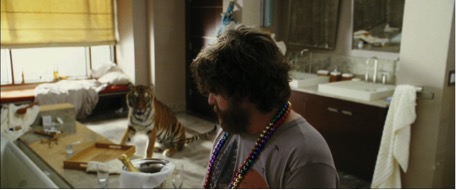“Man has long been diversely fascinated with animals.” [1] Mike Tyson counted pet tigers among his pets, Kristen Stewart and her mother raise wolf-dog hybrids, and Tippi Hedren kept a 400-pound mature lion in her home – allowing it to play by the pool, lounge in the living room, raid the fridge, and even permitted her daughter (Melanie Griffith) to take it to bed. They are hardly alone.[2] Just two weeks ago reports surfaced that former Baltimore Ravens defensive lineman Terrence Cody kept an alligator in his Baltimore County home. In fact, owning exotic pets is nothing new. Almost two centuries ago John Quincy Adams, the sixth President of the United States, lodged an alligator in a bathtub in the White House’s East Room.
While the reasons for keeping wild animals as pets vary, Gary West, an assistant professor of zoological medicine at Kansas State opined that “[p]eople like exotic animals for the ‘wow’ factor.”[3] Mike Tyson has, perhaps, expressed this sentiment best: “I am loaded. This guy on the phone says, ‘You can be driving your Ferrari with your cub in the front seat.’ I thought, ‘Yeah, when I come out, I’m gonna be a cool dude. I’m gonna have a tiger in my car. I’m gonna be a baller.’”[4]
One National Geographic article has expressed the belief that “more exotic animals live in American homes than are cared for in American zoos.”[5] So do exotic pets make good pets? The ASPCA puts it bluntly: “Exotic animals are not good pets.”[6] The South Carolina Department of Parks, Recreation & Tourism says: “Alligators make terrible pets.”[7]
Tragic reports involve such pets as a black bear in Allentown, Pennsylvania, a python in Oxford, Florida, a mountain lion in Odessa, Texas, and a deer in Waskom, Texas, just to list a few.[8] In Zanesville, Ohio, a couple kept a menagerie of exotic animals, including wolves, monkeys, Bengal tigers, leopards, grizzly bears, and lions. However, one of the owners apparently released the animals from the cages. Some animals were shot with tranquilizer darts and sent to the zoo, but sheriff’s deputies were forced to hunt and kill at least 49 animals. [9]
Given the hazards, almost all states have exotic pet laws regulating the private possession of wild animals.[10] For example, former Baltimore Ravens defensive lineman Terrence Cody was recently charged in the Circuit Court for Baltimore County with unlawful possession of an alligator.[11] In November 2012, Anne Arundel County police discovered a 3-foot long alligator inside a home while executing a search warrant.[12]
In Maryland, the General Assembly found possession of such animals to potentially introduce diseases and dangers to human safety.[13] With certain exceptions, the State bans the possession of specific animals, as well as certain large families of animals, including: foxes, skunks, raccoons, bears, caimans, alligators, crocodiles, members of the cat family other than the domestic cat (and hybrids over 30 pounds), members of the dog family other than the domestic dog (including hybrids), nonhuman primates, and certain family groups of poisonous snakes.[14] Local pet ownership laws and regulations may be even more broad or restrictive, often requiring certain permits.[15]
If you want to be a baller and own an exotic pet, be sure to consult federal, state, and local law first – not to mention “common sense and ethics.”[16] Failure to do so can not only lead to civil or criminal charges, the results can be disastrous.
[1] Lisa A. Cutts, Walking on the Wild Side: Classification and Liability for Owners of Wild-Domestic Animal Hybrids, 18 San Joaquin Agric. L. Rev. 71, 97 (2009).
[3] http://bigcatrescue.org/k-state-veterinarian-says-exotic-animals-like-lions-tigers-and-monkeys-should-not-become-pets/.
[4] http://usatoday30.usatoday.com/sports/boxing/story/2012-03-20/mike-tyson-talks-tigers-regrets-and-muhammad-ali/53678524/1.
[8] http://www.treehugger.com/endangered-species/6-tragic-stories-exotic-pet-ownership-gone-wrong.html.
[9] http://www.nytimes.com/2011/10/20/us/police-kill-dozens-of-animals-freed-from-ohio-preserve.html?pagewanted=all&_r=0.
[10] https://www.animallaw.info/statutes/topic/exotic-pets. There are also relevant federal laws that may govern.
[11] Additional charges included five animal cruelty counts for failing to provide the alligator with proper food, drink, veterinary care, space, and shelter. A copy of the indictment is available here.
[13] Md. Code Ann., Health-Gen. § 18-217.
[14] Md. Code Ann., Crim. Law § 10-621(b)(1).
[15] Maryland also permits counties and municipalities to enact more restrictive law s. Md. Code Ann., Crim. Law § 10-621(e). For example, Baltimore County also requires a permit for possession of “any animal of a species that in the natural life of the species is wild, dangerous, or ferocious.” Baltimore City requires a permit to keep “any animal normally found in the wild.” Prince George’s County requires a permit for “any animal which is not included in the definition of ‘domesticated animal’” – including hybrids. “Domesticated animal means an animal of a species that has been bred, raised, and is accustomed to live in or about the habitation of man, and is dependent on man for food or shelter.”
